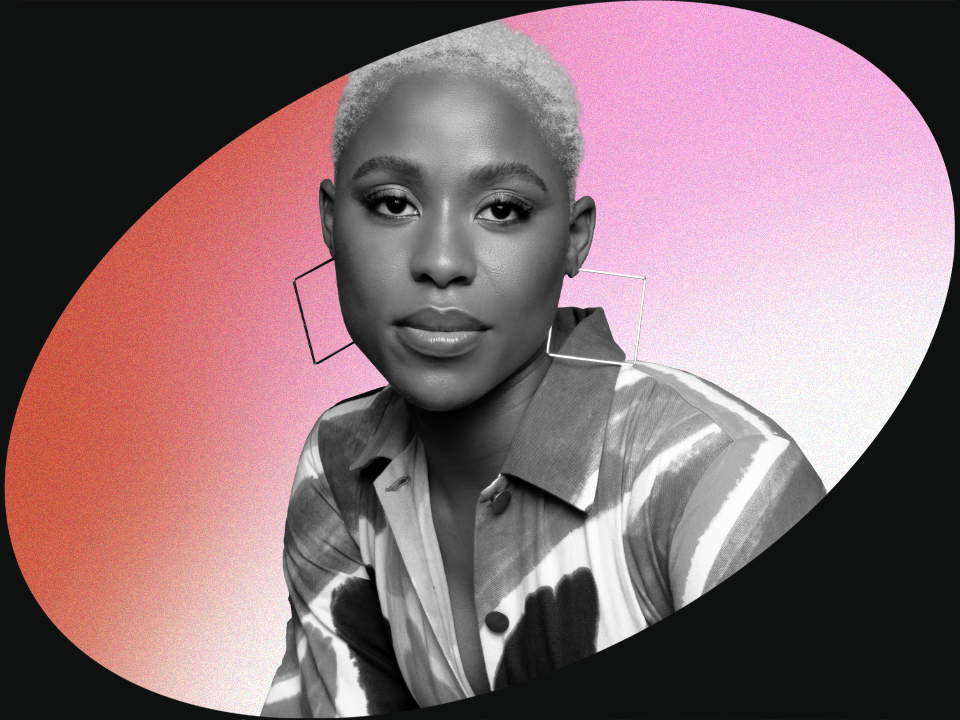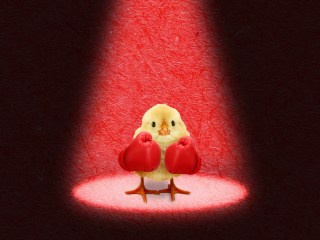Jerrie Johnson’s PTSD Diagnosis Changed the Way She Thinks About Mental Health
“I went through a little bit of a depression where I felt like: Does this mean that I'm not strong enough mentally?”
A relative newcomer to the entertainment industry, Jerrie Johnson burst onto the TV scene when she was the first to book a role in Prime Video’s hit series Harlem. After watching Johnson as Tye Reynolds (a 30-something tech founder who gets into so many delightfully messy situations, just like her three best friends), it’s clear why the show booked her without hesitation. And if you ask Johnson—who had only a couple of acting credits before this—she totally manifested the series regular role. Clearly, Johnson is on to something.
Now, the Philadelphia native and proud Aquarius is back for Season 2, which has a bunch of surprises in store for fans, Johnson teases. But for now, the topic of conversation is mental health and how their upbringing in Philly and college career in the Bay shaped her mental health today. Here, Johnson opens up about how they care for their mind by letting go of other people’s expectations, centering good communication, practicing manifestation, and finding security.
[Sign up here to never miss these candid conversations delivered straight to your inbox.]
WM: How are you doing lately?
Jerrie Johnson: I'm actually doing excellent. My birthday is coming up in a few days. … [And I] have been surprising myself with how well I've been doing, although I am in the midst of a press tour. So it's been interesting and beautiful, and [I’m having] lots of revelations and groundedness.
WM: How do you feel about where you're at in this stage of life?
JJ: I've never really been attached to the having-it-all-figured-out thing. There are some aspects that I maybe have more anxiety around than others. I mean, my family was very poor, so money is a thing. I've gotten myself through college and then through a master's program, and I've just always had to figure it out. I'm getting to a point where I've had to say to myself, “There's a lot of stuff that you don't know, and that's OK.” Because I've always figured it out, I didn't realize how much pressure I was putting on myself to know things that I just wouldn't be able to know.
For me, I never thought, Oh, when I turn this age, it should look like this. I've been more of an, OK, what can I manifest next? type of person. … Going into 29, I feel like I'm more settled in my personhood. I feel like I'm more flexible. I have rituals and things I know I should be doing or need to be doing, but I'm not trying to outrun any clock. Everybody wants to be in “30 Under 30” and do this by this [time]. I just want to be on the most authentic journey for me, and I want to continue expanding in a way that aligns with my values. Whatever comes from that is going to be beautiful, period.
WM: Can you elaborate a bit on how manifestation fits into your mental health journey?
JJ: It's recognizing what I want, being clear about what I want, and then assuring that my emotions align with that thing that I want. Living as if it is done or as if I already have [something] allows me to not be stuck in any emotions that can [pull me] away from the emotion that I want to feel in order to manifest the thing. I think it makes me more forward-footed about self-care and mental health because I know that I have to be in a certain space emotionally, physically, and spiritually to allow things to come in.
Instead of sitting in [a funk], I can acknowledge, How did I get here? What is this contrasting feeling? It's because I'm going toward this thing, and I actually want this other thing. Let me shift gears so I can take ownership over my joy and live in that joy and let the thing unfold in the way it's supposed to unfold. Because how is none of my business. Any contrasting feelings or any rut that I get into is because I'm trying to be in control of the how, and it's really not my business.
WM: Do you mind sharing what moments in your mental health journey stick out to you?
JJ: I remember moving to San Francisco. All of my family's in Philly; I don't know anybody outside the East Coast, so it was important for me to not be on the East Coast. So when I moved to the Bay [for grad school], I had this teacher who was the head of the program, and she was not the nicest person. I already have a white-woman trigger, so I felt the way she talked to me in class was different from everybody else.
There came a time where I felt like I was contorting so much. I would come into class, and I would have a lump in my throat. One day, my body just shut down. My body was warm, but I was cold, and my throat was so tight, and it was crazy. Nothing like that had ever happened.
I went to the doctors; the doctors couldn't figure it out. I went to see my therapist, and she was like, “You have PTSD, and it comes from a history of growing up and your boundaries just continuously being bulldozed.”
So I'm in this class with this person, and I feel like I have no voice, and my PTSD is triggered. I went through a spiral about what does this mean for me? I've never had to deal with any mental health things [before]. … I went through a little bit of a depression where I felt like, Does this mean that I'm not strong enough mentally?
That began the journey of truly dismantling all of these scripts that I had learned [and realizing], Oh, this isn't mine. This is somebody else. I started a ritual of sending traumas back that weren't mine, forgiving myself, and forgiving people. It truly changed the course of my being and the ownership I had over my mental health and my body and how I engage with people.
I realized I was always going out, and it was me running away from home. When I was in Philly, I never wanted to be home, so I was always somewhere else. Then I'm like, Maybe I don't like to go out that much, even though I'm the life of the party. Maybe I need to take a step back. I started to really massage my introvertedness, which was new. Then I realized, Wow, you are giving million-dollar checks energetically, and you're cashing in pennies. People are plugging into your outlet, and no one's giving you any power back.
It was an awakening moment for me because I'm like, Nobody's going to advocate for you to be alone, Jerrie, because too many people benefit from you. Unless you take the time to really sit with yourself, you're going to be driven crazy, and people are going to suck you dry. I attribute that to being in the Bay Area and the healing energy for me in the Bay Area. Those were the moments where I was like, OK, let's get it together, and let's figure this out.
WM: How do you draw that line with people after realizing they do drain you?
JJ: I like to let people know upfront what I have the capacity for. When people are planning things, I'm like, It sounds like a good idea for me today, but can we check back in the night before? 'Cause my feeling might change about it.
I took this course at the end of 2021, and it was really amazing for me because it helped me map out what my values are in romantic relationships, friendships, or otherwise. … For me, it's about intelligence, emotional intelligence, authenticity, and autonomy. I was in these relationships where people didn't have autonomy, and so they wanted to be in control of my autonomy in an interesting way. Once I got clear on that, then I could create more clear boundaries.
[It’s important to be clear that] it's not personal and knowing that it's flexible. … I should be able to say when and where I want to do what I want to do. When I was living in Philly and going back during undergrad, I realized it's hard for me to say no to my family members. There were a lot of skills I had, like doing hair. When I would come home, everybody wants their hair done, people want their makeup done, and everybody wants it done for free. … It's not sustainable; it's not feasible. So I try to stay ahead of it and let people know because communication is at the top of my [values] list.
I realized I had some relationships where things would happen, and no one would talk about it, and then we would move on. But I'm in the truth and reconciliation era of my life. Generational trauma was able to perpetuate in my family dynamic because people didn't communicate. I cannot recreate those habits in any type of relationship. If we can't talk about this, we can't talk at all. That's a big boundary for me.
With romantic relationships, I have a worksheet that I send to people I'm getting serious about, and it’s just about how I like to love, my values, what I’m looking for, and my capacity. I'm a poly person, so [I share] how that works for me and be clear with people so the expectations can be managed. [I’m like], “Here it is, and you can decide to engage or not, but you have the information you need.”
WM: How do people usually respond?
JJ: Oh my God, people are very impressed. They always ask, “Did you write this yourself?” Which, I'm like, “Bitch, I got two degrees. I can write, first of all.”
But I think people are also like, Oh, now that I have this, I can ask more specific questions. Because I do think when I enter into romantic relationships with people who are not poly, haven't had that poly experience, or have experienced poly or ethical nonmonogamy in a very triggering or traumatic way, then [I’m able to dispel] the questions, “You just want to be poly because of this. Are you poly because of this? You just want to have sex with a bunch of people.” Like, no no, no, no, no.
WM: Do you have any mental health goals for 2023?
JJ: I am manifesting a brand new relationship with finances. I think my biggest mental health triggers are finances. I can go into a whirlwind of anxiety and so many different things around finances because I've always had to be in control of them.
The underlying thing is my family has been homeless before. When I first moved to college, I got a call the first week saying, “The house caught fire, and now we're in a shelter.” I'm like, Should I go home? I have a home here, but I feel guilty because they're houseless. My underlying fear is that I will be homeless. When funds are low or I don't know where the next thing is coming in, that Jerrie, you are going to be homeless trigger kicks in, and immediately I am in fight or flight, PTSD survival mode.
I want to create a better relationship with the ebbs and flows of being in the industry and my finances and also be open with people who can help. I have an aunt who would tell me, “Don't ask anybody for money. That's begging. You have to just figure it out.” She drilled that into me. I remember being in undergrad, having to ask for scholarships, and my throat getting so tight because, in my mind, I was begging. I had to send that [script] back to her.
I'm realizing that's where my strong desire to own land comes from. … That, for me, is a big step to knowing you're safe, you're good, you're comfortable.
WM: Anything else on your mind about mental health?
JJ: I am an advocate of having your mental health reflect you. … Figure out what you and your body like. What's the thing that gets you quiet and makes everything else easier? Also, read and get closer to you—outside of whatever public persona you feel like you have to build in order to survive in the age of technology. You don't have to catch up with anybody. There is no time limit. There is no rush. Figure out who you are for real, for real, and what you want.
This interview has been edited and condensed for length and clarity.
Wondermind does not provide medical advice, diagnosis, or treatment. Any information published on this website or by this brand is not intended as a replacement for medical advice. Always consult a qualified health or mental health professional with any questions or concerns about your mental health.




